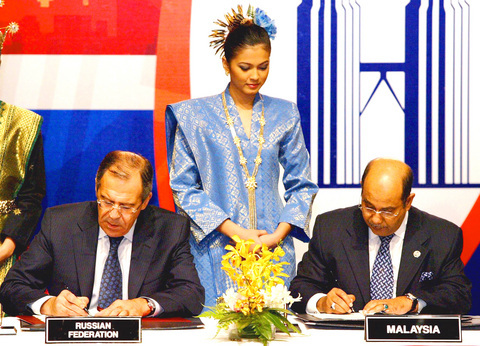Singapore Prime Minister Lee Hsien Loong (
"More needs to be done to liberalize economic sectors and remove internal barriers to business and investment in the region," Lee told a business forum on the sidelines of the annual Association of Southeast Asian Nations summit.
"One reason why ASEAN has not been more successful in attracting investments is the relatively high costs of operating in the region," he said.

PHOTO: EPA
"ASEAN currently still operates as 10 different economic entities with different rules and standards, all of which raise transaction costs," he said.
Lee said the bloc must put aside its squabbles and embrace foreign investment and competition.
"Even though there will be political sensitivities, ASEAN must find ways to open up more economic sectors, remove non-tariff barriers and reduce costs for business to operate seamlessly across individual economies," he said.
Lee cited a study commissioned by ASEAN which showed that an integrated market would boost the region's gross domestic product by 10 percent and cut operational costs by one-fifth.
ASEAN represents a market of some 550 million people with a combined GDP of US$1 trillion, but its members range from wealthy Singapore to impoverished Laos, and from democracies like the Philippines and Thailand to military-ruled Myanmar.
Lee said the Asian economic landscape was being shaped not only by the rapid rise of China and India but also by the resurgence of Japan and an aggressive push in South Korea to tap new growth areas like media, entertainment and information technology.
"We face a fundamental choice -- we can either move forward to seize the opportunities opening up in the region, or shrink back at the formidable competition that is emerging," he said.
With ASEAN fragmented, investors will think it is "too small to pay attention to," he said.
Lee cited studies showing that China drew US$60 billion in foreign investments last year, or about 2.5 times the amount that flowed into ASEAN.
"In order to stay in the game, ASEAN must therefore take decisive action. It must link up more closely to its partners. Amongst ourselves, we must integrate our economies more rapidly so that we can be more competitive as a whole region," he said.

Leading Taiwanese bicycle brands Giant Manufacturing Co (巨大機械) and Merida Industry Co (美利達工業) on Sunday said that they have adopted measures to mitigate the impact of the tariff policies of US President Donald Trump’s administration. The US announced at the beginning of this month that it would impose a 20 percent tariff on imported goods made in Taiwan, effective on Thursday last week. The tariff would be added to other pre-existing most-favored-nation duties and industry-specific trade remedy levy, which would bring the overall tariff on Taiwan-made bicycles to between 25.5 percent and 31 percent. However, Giant did not seem too perturbed by the

Foxconn Technology Co (鴻準精密), a metal casing supplier owned by Hon Hai Precision Industry Co (鴻海精密), yesterday announced plans to invest US$1 billion in the US over the next decade as part of its business transformation strategy. The Apple Inc supplier said in a statement that its board approved the investment on Thursday, as part of a transformation strategy focused on precision mold development, smart manufacturing, robotics and advanced automation. The strategy would have a strong emphasis on artificial intelligence (AI), the company added. The company said it aims to build a flexible, intelligent production ecosystem to boost competitiveness and sustainability. Foxconn

TARIFF CONCERNS: Semiconductor suppliers are tempering expectations for the traditionally strong third quarter, citing US tariff uncertainty and a stronger NT dollar Several Taiwanese semiconductor suppliers are taking a cautious view of the third quarter — typically a peak season for the industry — citing uncertainty over US tariffs and the stronger New Taiwan dollar. Smartphone chip designer MediaTek Inc (聯發科技) said that customers accelerated orders in the first half of the year to avoid potential tariffs threatened by US President Donald Trump’s administration. As a result, it anticipates weaker-than-usual peak-season demand in the third quarter. The US tariff plan, announced on April 2, initially proposed a 32 percent duty on Taiwanese goods. Its implementation was postponed by 90 days to July 9, then

AI SERVER DEMAND: ‘Overall industry demand continues to outpace supply and we are expanding capacity to meet it,’ the company’s chief executive officer said Hon Hai Precision Industry Co (鴻海精密) yesterday reported that net profit last quarter rose 27 percent from the same quarter last year on the back of demand for cloud services and high-performance computing products. Net profit surged to NT$44.36 billion (US$1.48 billion) from NT$35.04 billion a year earlier. On a quarterly basis, net profit grew 5 percent from NT$42.1 billion. Earnings per share expanded to NT$3.19 from NT$2.53 a year earlier and NT$3.03 in the first quarter. However, a sharp appreciation of the New Taiwan dollar since early May has weighed on the company’s performance, Hon Hai chief financial officer David Huang (黃德才)